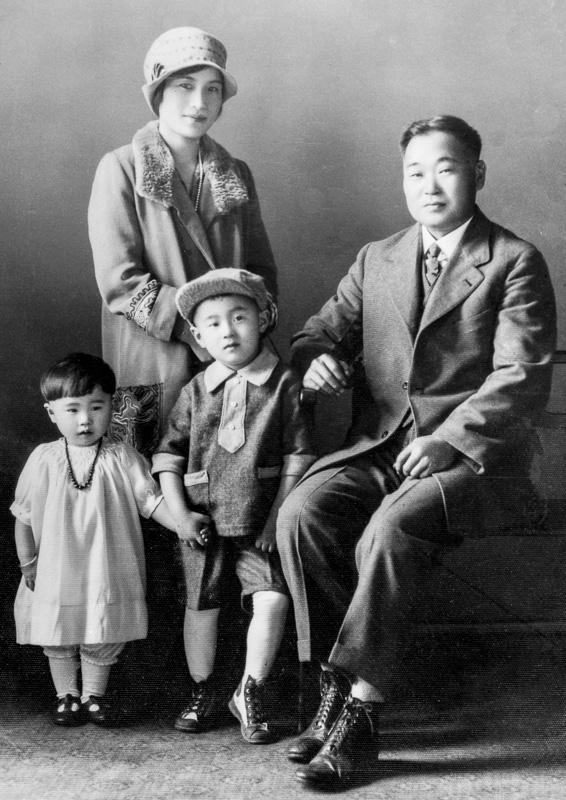
Atsuo & Yuka Takahara Nakata
Camp Name:
Minidoka
Block Number:
34
Barracks Number:
9
Military Service:
Yes
Atsuo & Yuka
Takahara Nakata
Seattle 1920.
Here she was, sitting on the train from Seattle to Portland, several seats behind the man that was to become her husband. During the trip, he passed an orange back to her. She would recall it as the most delicious orange she had ever tasted.
Just that morning, the 21-year-old Yuka had disembarked from a long and sometimes terrifying boat journey from Okayama with other young Japanese brides to be. She was the eldest child with three younger sisters and a baby brother. Her photograph, a tiny piece of paper coated by silver gelatin had been sent ahead as the tangible promise of her coming. It was now held in the hand of Atsuo, to help him know that she was “the one.” The one with whom he would spend the rest of his life.
Atsuo, a big strapping man, had arrived in America in January of 1906. He was also from Okayama and had come to make his fortune.
For the next twenty-one years they would settle in the Portland area, raising three children, Hiroshi, Yoshiko, and Sumio. Later, as was the custom then, their names would take on the more “American” personae of their country, Harry, Mary, and Smith.
During the Depression, Yuka and Atsuo traveled from city to city, farm to farm trying to make enough money to feed their children. This meant that they were often forced to leave 12-year-old Harry in the care of his younger siblings and with the watchful eyes of their neighbors, the Wrights.
In 1941, things were beginning to look better. The family had moved to Portland. Atsuo now had a good job at a fishing cannery and Yuka worked as a waitress in a sukiyaki restaurant.
Then the war started with Japan. They were rounded up and sent to the Portland Assembly Center and later shipped off to Hunt Idaho’s Camp Minidoka. There, Atsuo worked on a truck, presumably helping out with the farming and Yuka worked in the kitchen of the mess hall. They each earned $12 a month.
Traditional family meals of Japanese food, meant being able to sit together as a family to learn the civility and customs of sharing a meal, but this tradition had evaporated in the heat and dust of the desert. Strange new foods, like Mutton and vegetables from tins now appeared on their plates.
Harry, their eldest son, would enlist in the army and was on a ship to Europe when Victory was declared.
In 1945 they were allowed to leave camp. Instead of returning to Portland, Atsuo decided to start a business in Spokane, Washington. He bought a laundry called the “Sing Kee Chinese Hand Laundry.” The painted sign on the window allowed the soldiers of nearby Geiger Field to bring in their uniforms and shirts to be cleaned without prejudice. The soldiers would call their daughter Mary Kee, which she did not dispute, as there were still strong feelings against the Japanese.
In the years that passed and as the overt racism ebbed, they moved across the street to a bigger and better place and named it Bernard Hand Laundry after the street.
Together, Atsuo and Yuka had come to a new country overcoming the barriers of language, racism and war. They had experienced the worst and the best of what America had to offer. In the ’60s they enjoyed a quiet retirement in a perfect little house with fresh cut wood stacked high in the garage, fruits and vegetables growing in the yard, canned goods in the root cellar, and bowls of tsukemono weighted down with a special rock. Yuka literally made her home by filling it with her creations of crocheted afghans, satin tucked pillows, arm chair doilies, and with the laughter of her boisterous very American grandchildren and great grandchildren.
Their children and grandchildren and great grandchildren appreciate and remember them for their courage, bravery, and self-sacrifice that today allows each of them to enjoy the freedoms of this country.
The journey that began in Seattle with a shared sweet orange in 1920 came to an end in 1968 when Atsuo passed away in Spokane. Yuka left us in 1991 at the age of 93 in Seattle.
Camp Minidoka
Block 34
Barrack 9
Atsuo Nakata 09-15-1888
Yuka Takahara Nakata 12-10-1898